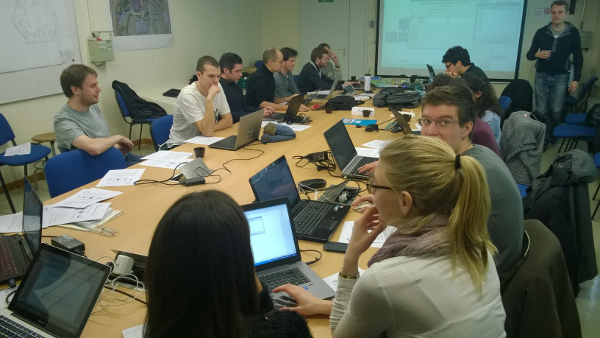![]() Accelerator Reliability and Availability Training
Accelerator Reliability and Availability Training
By Johannes Gutleber (CERN)

Participants of the Accelerator Reliability and Availability (ARA) training programme trial in March 2016 (Image: CERN)
Reliability and sustainability is a key issue for present and future accelerators. The Future Circular Collider (FCC) study launched a training programme on Accelerator Reliability and Availability (ARA) engineering at CERN. The goal is to build a common foundation in the field of reliability engineering for particle accelerators and to create an active network of accelerator engineers who can assess and address reliability topics. Within the next three years a community of about 150 accelerator experts will be trained in reliability engineering.
A trial session was organized end Februaruary 2016 at CERN, which was attended by more than 20 engineers currently involved in the operation of the LHC, the HL-LHC construction, as well as in the conceptual design study of a post-LHC circular collider.
The training establishes a common terminology and set of methods used by experts from different technical domains, ranging from mechanical engineering, electronics, and software to cryogenics, superconductivity, vacuum, radiofrequency, and power engineering. The course conveys the mathematical foundations of reliability analysis and creates a sensibility to the importance of gathering field data and controlling the data quality as the pre-requisite for any reliability engineering activity. Over the coming six months, the course organisers will further develop the practical examples from the particle accelerator domain ranging from modelling vacuum systems, cryogenics supply, machine protection to beam production. This will allow the participants to profit from the methods and tools taught in their everyday operation and design work. The organizers also put special focus on equal opportunities which was already reflected in the attendance of the trial session with an outstanding 25% of female participation. The training is provided by University of Stuttgart, Tampere University of Technology and spin-off company Ramentor.
The “Foundations in Accelerator Reliability and Availability Engineering” course will start in autumn 2016 and it will run twice a year until 2018. The course will be free of charge for personnel involved in the conceptualisation and design of future circular colliders at CERN.
Read more about the training programme here.
